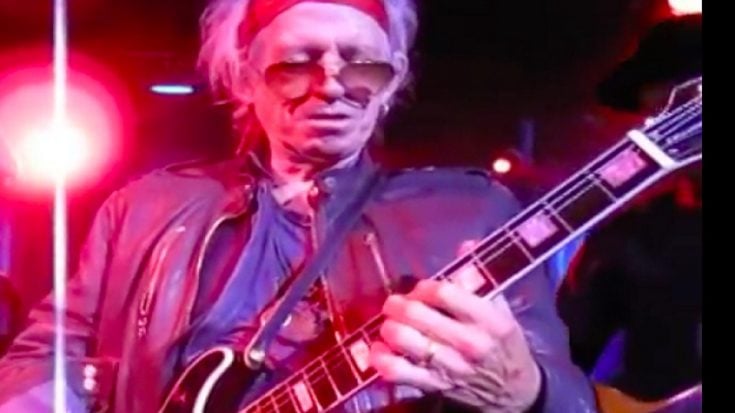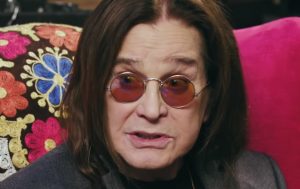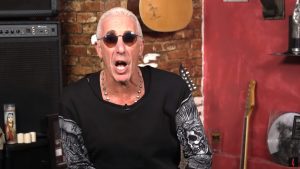Fans Have Voted The 20 Druggiest Rockstars In History

photo credits to youtube.com/KeithRichards
Rockstars have long had a complex relationship with drugs, often intertwining their music careers with substance abuse. From the psychedelic experimentation of the ’60s to the hedonistic excesses of the ’80s, drugs became synonymous with the rock and roll lifestyle.
Icons like Jimi Hendrix, Janis Joplin, and Jim Morrison tragically succumbed to drug-related deaths, underscoring the darker side of fame. While some, like Keith Richards, managed to survive their drug-fueled escapades, many others suffered the consequences of addiction, leading to ruined careers, fractured relationships, and untimely demises.
Amid the haze of rockstar excess, stories of overdoses, rehab stints, and tumultuous personal lives abound, creating a narrative that’s equal parts fascination and cautionary tale. This list was based on Ranker.com’s poll called “The Druggiest Rock Stars of All Time”.
And as of the publishing of this article, fans voted these rock icons as the ones with the most splendid stories involving drugs.
20. Jerry Garcia
This list is going to be crazy if it ranked a man called Captain Trips at 20.
Jerry Garcia, the iconic guitarist and founding figure of the Grateful Dead, had a complex relationship with drugs throughout his life. Recognized for his groundbreaking contributions to music, Garcia also became synonymous with the counterculture movement of the 1960s and 70s, a period characterized by experimentation and rebellion against societal norms, including drug use.
While Garcia’s psychedelic-inspired music often resonated with the experiences of those exploring altered states of consciousness, he personally grappled with the challenges of substance abuse. His battles with heroin addiction were well-documented and took a toll on his health, ultimately leading to his untimely death at the age of 53.
19. Snoop Dogg
Acclaimed rapper and cultural icon Snoop Dogg has long been associated with a public persona that includes his open discussions and affiliations with cannabis. From his early rise in the 1990s to his present-day status as a multifaceted entertainer, Snoop Dogg has been unapologetic about his affinity for marijuana.
His laid-back demeanor, distinctive style, and frequent references to the plant in his music have made him a prominent advocate for its legalization. While Snoop Dogg’s cannabis advocacy has been a defining aspect of his image, it’s important to note that he has also diversified his endeavors, spanning across music, television, entrepreneurship, and philanthropy.
18. Steven Tyler
Aerosmith’s Steven Tyler has a well-documented history intertwined with substance abuse. Throughout his career, Tyler’s struggles with drugs and alcohol have been publicized, highlighting the challenges and consequences that can accompany fame and excess.
Although the frontman’s charismatic stage presence and powerful vocals contributed to the band’s success, his battles with addiction led to periods of turmoil within the band and his personal life. In more recent years, Tyler has been open about his journey to sobriety, using his experiences to raise awareness about the perils of substance abuse and the importance of seeking help.
17. Whitney Houston
Whitney Houston’s story is one of the most tragic stories involving drug abuse. The immensely talented and acclaimed singer grappled with a highly-publicized battle against drug addiction that ultimately cast a shadow over her remarkable career. Houston’s exceptional vocal range and captivating performances catapulted her to international stardom, making her one of the most successful artists in music history.
However, her struggles with substance abuse, particularly cocaine, became a subject of media scrutiny and speculation. Despite her undeniable talent, Houston’s personal demons led to strained relationships, periods of decline in her musical output, and a tragic decline in her health that ultimately led to her death.
16. Keith Moon
Legendary drummer and prankster Keith Moon was known for two things: his incredible energy on and off stage and his tumultuous relationship with drugs and alcohol. Moon’s drumming style was a pivotal element in defining The Who’s sound and stage presence, earning him a reputation as one of the greatest drummers in rock history.
However, his exuberant personality was accompanied by a pattern of excessive behavior, including his use of drugs like amphetamines and alcohol. Moon’s wild antics and substance abuse contributed to both moments of brilliance and moments of chaos within the band, and his tragic death at the age of 32 due to a drug overdose marked the end of a brilliant but tumultuous era.
15. Scott Weiland
Scott Weiland, the charismatic lead vocalist of the influential rock bands Stone Temple Pilots and Velvet Revolver, battled a turbulent relationship with drugs throughout his life. Weiland’s distinctive voice and enigmatic stage presence made him a prominent figure in the 90s alternative rock scene, garnering him a dedicated fanbase.
However, his struggle with substance abuse, particularly heroin and cocaine, was a recurring theme that often eclipsed his musical achievements. Despite periods of creative success, Weiland’s drug-related issues led to numerous arrests, stints in rehab, and strained relationships with bandmates.
14. Iggy Pop
Iggy Pop is more than just the shirtless stage icon that he was. The legendary frontman of The Stooges navigated a dynamic relationship with drugs that both shaped his music and defined his persona. Renowned for his raw energy and boundary-pushing performances, Iggy Pop’s influence on punk and rock music is immeasurable.
His experimentation with drugs, particularly during the 1970s, was emblematic of the counterculture movement’s embrace of altered states and rebellion against convention. His onstage antics and uninhibited demeanor were fueled by his willingness to explore the fringes of experience, often accompanied by substances like heroin and amphetamines.
13. Rick James
Rick James is a flamboyant and electrifying funk artist that had a career deeply entangled with the world of drugs. Known for his hits like “Super Freak” and his distinctive musical style, James rose to fame during the 1970s and 1980s. However, his personal struggles with substance abuse, particularly cocaine, were a constant companion throughout his journey.
His extravagant lifestyle, punctuated by wild parties and excess, was fueled by his addiction and contributed to both his creative successes and personal setbacks. Despite moments of brilliance in his music, James faced legal troubles and periods of incarceration as a result of his drug-related actions.
12. Bobby Brown
Accomplished R&B sensation Bobby Brown is often associated with a turbulent relationship with drugs that cast shadows on his achievements. Rising to fame as a member of New Edition and later establishing a successful solo career, Brown’s talent was undeniable. However, his battles with substance abuse, notably cocaine and alcohol, became a recurring theme in his life.
His marriage to the late Whitney Houston further placed the spotlight on their shared struggles with addiction, creating a narrative of both triumphs and challenges. Brown’s public persona, marked by legal troubles and stints in rehab, highlighted the destructive nature of drug abuse even in the face of musical accomplishments.
11. Nikki Sixx
Nikki Sixx, Motley Crue’s bassist and primary songwriter, has a legendary history of battling addiction. As a central figure in the glam metal scene of the 1980s, Sixx’s larger-than-life persona and music contributions made him a rock ‘n’ roll icon. However, his life was marked by a harrowing struggle with substance abuse, including heroin addiction.
His autobiographical account, The Heroin Diaries: A Year in the Life of a Shattered Rock Star, provided an unfiltered glimpse into the depths of his addiction and its impact on his life and relationships. Overcoming his addiction, Sixx became an advocate for recovery and has used his platform to raise awareness about the dangers of drug abuse.
10. Courtney Love
This enigmatic frontwoman of the alternative rock band Hole has been a polarizing figure known for her relationship with drugs and Nirvana frontman Kurt Cobain. As a charismatic and outspoken artist, Courtney Love’s impact on the 1990s grunge movement was undeniable. However, her personal struggles with drug addiction, particularly heroin, became a central theme in her life and career.
Love’s erratic behavior and legal issues often overshadowed her musical talents, and her marriage to Cobain further placed her in the public eye, surrounded by controversies related to substance abuse.
9. Amy Winehouse
Amy Winehouse’s story is a heartbreaking narrative of a gifted artist grappling with the demons of substance abuse. The immensely talented British singer-songwriter was not only often remembered for her soulful voice and unique style but also for her tragic battle with drugs.
Rising to fame with her album “Back to Black,” Winehouse’s music was celebrated for its emotional depth and vintage flair. However, her struggles with alcohol and cocaine were widely documented and took a heavy toll on her health, relationships, and career. Despite her exceptional potential, Winehouse’s life was cut short at the age of 27, a stark reminder of the devastating consequences of addiction.
8. Tommy Lee
The second member of Motley Crue on this list is Tommy Lee, renowned drummer and co-founder of the band. Lee’s musical history and accomplishments are closely intertwined with his experiences with drugs.
His rockstar lifestyle was marked by a period of alcohol and cocaine abuse; Lee’s addiction challenges occasionally overshadowed the band’s successes, but his journey to recovery and subsequent commitment to a healthier lifestyle has become an inspiring facet of his story.
7. Keith Richards
This guitarist’s legendary status did not diminish despite his well-known struggles with drugs and alcohol. Keith Richard’s band, The Rolling Stones, unabashedly embraced the “sex, drugs, and rock and roll” adage of the genre.
Renowned for his riffs and contributions that stood the test of time, Richards’ image as a rebellious figure became inextricably linked with his substance use. His experimentation with various drugs, including marijuana, LSD, and heroin, was representative of the counterculture movement of the 1960s and 70s. While his drug use contributed to his mystique and creative process, it also led to legal issues, health challenges, and moments of tumultuous relationships within the band.
6. Jim Morrison
When you’re known as the quintessential rockstar bad boy, it is without a doubt that drugs and alcohol are priorities on your to-do list. Jim Morrison is often remembered not just as a poet and charismatic singer but also as an alcoholic and drug addict.
As a key musical force in the 1960s rock scene, the enigmatic frontman’s lyrical depth and hypnotic vocals captivated audiences and endeared him to the fans of his band The Doors.. However, his experimentation with drugs, particularly LSD and alcohol, became a major stumbling block. While his drug use seemed to fuel his creative process, it also contributed to moments of unpredictability on and off stage and was a factor in the Doors’ eventual decline.
His death at the age of 27 remains a cautionary tale about the unwelcome effects of the lavishness of rock and roll excess.
5. Jimi Hendrix
Jimi Hendrix was an unparalleled guitar virtuoso and a pioneering force in rock music. But his complex relationship with alcohol and drugs, though shaped his career and creativity, was the main reason for his untimely death at 27.
Hendrix’s innovative playing style and genre-defying sound revolutionized rock and made him an icon of the 1960s counterculture movement. His exploration of psychedelic drugs was deeply woven into his creative process and it has often influenced his music, enhancing his boundary-pushing compositions and live performances. Tragically, this also cut Hendrix’s life short: he died of asphyxia caused by barbiturate intoxication in 1970.
4. Kurt Cobain
Grunge legend Kurt Cobain’s death in 1994 was one of the most talked about incidents of the 90s. The lore and tragedy surrounding his death nearly eclipsed his achievements as a genre-defining musician.
The iconic frontman’s distinct voice and emotionally charged songwriting propelled Nirvana to the forefront of the 1990s grunge movement, reshaping the landscape of rock music. Despite his meteoric rise, Cobain’s struggles with drug addiction, particularly heroin, remained at the forefront and interfered with his creative brilliance. His lyrics often conveyed his inner turmoil, providing a raw and unfiltered glimpse into the personal battles he faced.
Cobain’s death by suicide at the age of 27 shook the music world and amplified discussions about the pressures of fame, mental health, and the harrowing consequences of addiction.
3. Janis Joplin
Janis Joplin, the electrifying blues-rock singer, is both celebrated for her powerful voice and remembered for her tragic battles with drugs. Rising rapidly in the late 1960s due to her soulful performances and distinctive voice, Janis’ experiences with heroin, amphetamines, and alcohol, were deeply coiled around her journey.
Joplin’s uninhibited stage presence and emotive lyrics were often fueled by her quest for personal freedom, but her addiction struggles took a toll on her well-being and contributed to her untimely death at the age of 27.
2. Sid Vicious
Sid Vicious already had an ugly mark in rock history way before he was accused of murdering his girlfriend Nancy Spungen. The only contribution he had when he was the bassist of the punk rock band Sex Pistols was embodying the rebellious attitude and unconventional style of the anti-establishment ethos of his time.
However, Vicious’s involvement in the punk scene was cut short by the tragic death of his girlfriend and his subsequent arrest. His own life ended in a similarly tragic manner, succumbing to a heroin overdose at the age of 21.
Honorable Mentions
Before we reveal the druggiest rocks star of all time, according to fans at least, let’s take a look at the celebrities who didn’t break the top 20 but are still known for their legends about substance abuse that are equal parts noteworthy and haunting.
Layne Staley, Willie Nelson, Johnny Cash, Syd Barrett, Stevie Nicks, David Crosby, Steven Adler, Lil Wayne, Ol’ Dirty Bastard, Mick Jagger, Slash, Dee Dee Ramone, David Lee Roth, Elvis Presley, Kid Rock, John Bonham, David Bowie, Judy Garland, Eddie van Halen, Flea.
1. Ozzy Osbourne
Scientists were once baffled by how hardy The Princes of Darkness is. His decades of drug and alcohol should’ve killed him many times over. But the fact that the five rockstars preceding Ozzy Osbourne in this list were all dead is a testament to his enduring legacy as one of the druggiest rockstars in history.
The legendary frontman of Black Sabbath is renowned not only for his pioneering contributions to heavy metal but also for his storied history with illicit substances. Ozzy’s distinctive vocals and theatrical performances as well as his addiction became prominent facets of his public persona.
From legendary tales of biting the head off a bat on stage and snorting ants on the ground to candid admissions of substance abuse struggles, Osbourne’s journey has been marked by both moments of wild excess and candid revelations about the challenges of addiction.











